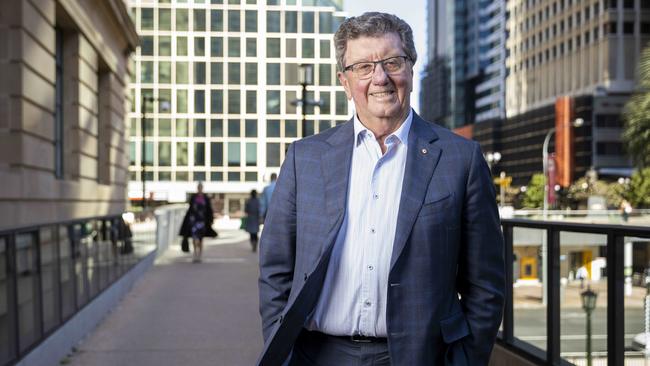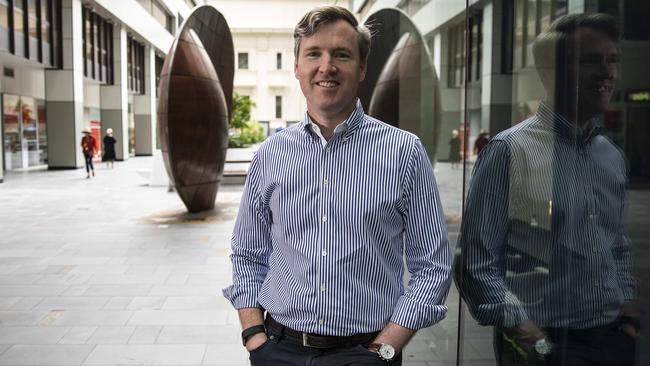Trevor St Baker slams ‘virtue signalling’ banks on coal
Trevor St Baker, who owns stakes in a coal plant and a Brisbane EV charging firm, warns bank moves against fossil fuels could hurt the economy.

Energy billionaire Trevor St Baker has slammed “virtue signalling” Australian banks for failing to lend money to coal producers and warned a major court ruling against Shell threatens the future of the nation’s coal-fired power stations.
Mr St Baker, who owns stakes in both a major NSW coal plant and Brisbane electric vehicle charging firm Tritium, said moves by banks against the fossil fuel industry could hurt the nation’s economy.
“Virtue signalling by bank managers saying they will not lend to an essential industry in Australia is going to bugger this country’s businesses,” Mr St Baker told the Credit Suisse 8th Australian Energy Conference on Wednesday.
“As for this crap that the banks have to look at their climate risk, the risk of banks not investing in existing essential industries for Australian wealth is if they go out of business, it will destroy economies.”
ANZ chief executive Shayne Elliott said in December he was proud the bank had not lent “a dollar” to any coal miners since his appointment in 2016, while the nation’s bank regulator has warned of the unprecedented impact of climate change on all parts of the financial system, putting lenders and insurers on notice they need to be on top of the risks to their businesses.
A string of shareholder and legal actions calling for greater climate action by big oil companies has hiked pressure on energy companies amid a fast-paced transition to cleaner sources of supply.
Shell, owner of major Queensland and West Australian LNG projects, was last week found by a Dutch court partially responsible for climate change and ordered to sharply cut carbon emissions.
Mr St Baker — a part-owner of the Vales Point coal plant in NSW — said the Shell ruling could have sizeable repercussions globally, and for assets including coal-fired power stations in Australia.
“The Shell decision in the Netherlands is now in the legal precedent and I don’t know how anyone can be in business in coal-fired power stations. Australian people have to worry about their jobs. Unless that’s appealed successfully, I don’t know how anybody can stay in business with that risk because you can’t even go and insure against that risk. They won’t insure you,” Mr St Baker told the conference.
“I go to board meetings and we have to put up with these people who own one share and want to spend all the time talking about environment, social and governance and talking about why you‘re not doing this. And the idea that the biggest corporations in the world are laggards. Shell isn’t a laggard, this is a long-haul change.”
The Shell move followed a landmark International Energy Agency report that found no oil or gas fields should be opened up if the world was to reach net-zero emissions by 2050.
Still, several high-profile investors disagreed with the veteran energy executive.
Clean energy investor Providence Asset Group said the events showed the pace of change in the industry and expects financiers to continue pulling back from investment in both the coal and oil and gas industries.
“We’ve seen it happen in coal and we’ll continue to see it in oil and gas as well,” Providence Asset Group executive adviser Stephen Craen told the conference.
“In terms of the policies banks will use, there are a number of things that will make it more difficult for them to lend. Private banks tend to be led by multinationals and we’re seeing banks led by the International Finance Corporation all starting to pull back.
“That’s partly for environmental reasons and partly to use their limited resources to stimulate the transition.
“I do think it is a watershed year. But I don’t think it is fair for governments to leave it to corporates or consumers to lead where we are going. The government’s role is to lead where we’re going,” Mr Craen said.
Shell Australia chair Tony Nunan said there have been multiple transitions in the energy industry and it would continue moving towards cleaner forms of generation.
“Our job is to make sure that we continue to invest in those new energy sources and we make it work. Because companies of our scale with our financial horsepower have to be the ones that drive it and we have to be the ones that make it work. If we don’t, the investment won’t follow up behind it.”

Companies including Woodside Petroleum and Chiyoda told the conference on Tuesday that adverse climate votes were simply part of the ongoing energy transition that had been underway for a number of years, and did not represent a watershed moment.


To join the conversation, please log in. Don't have an account? Register
Join the conversation, you are commenting as Logout